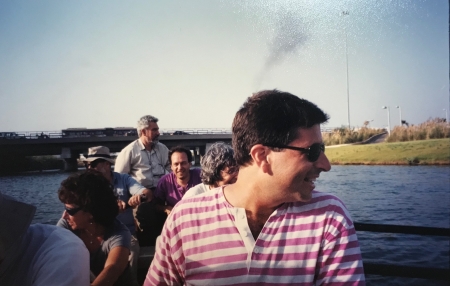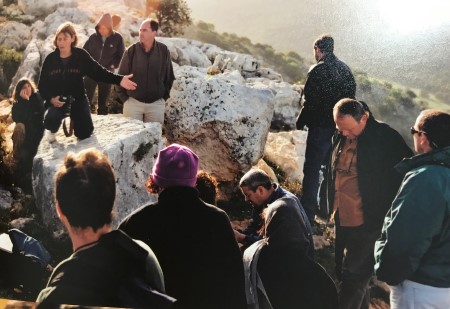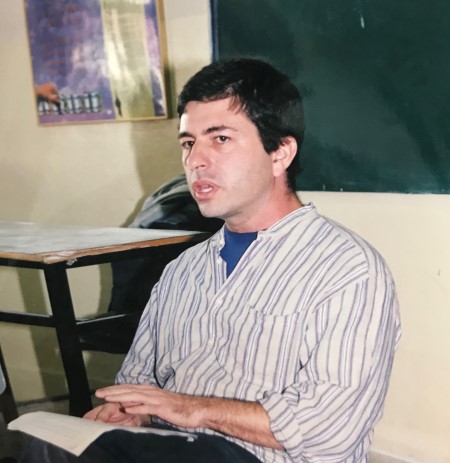How does one summarize the impact of one organization on an entire society?
We could enumerate the hundreds of actions and initiatives that we have promoted during the two decades of our existence. We could mention the thousands of activists, officials, decision-makers etc. who have been our partners on this journey; those who studied and worked with us, and those we influenced. We could also tell a story about a small group of visionary men and women, and how they tried to realize their vision among ever-expanding circles in Israeli society in order to eventually change the face of that society as a whole.
The Heschel Center was founded in the late 1990s, with the aim of making Israel a more sustainable society.
What does that mean?
Contrary to popular opinion, which identifies sustainability primarily with “being green”, or with nature conservation and environmental protection, the physical environment is only one of three dimensions that make up the vision of sustainability. True sustainability represents a combination of environment, society and economy.
Or, as we like to put it: “A democratic and robust economy that serves a just and cohesive society which exists in a productive, diverse and healthy environment for all – now, and for generations to come” (The Heschel Center’s definition of sustainability).
Our vision is nourished by multiple sources. Though many of these arise from the global discourse of thinkers and activists in various countries worldwide, we have also drawn inspiration from the personal example of Abraham Joshua Heschel (rabbi, thinker, author, and social activist), after whom the Center was named.
Throughout his life, Heschel represented a unique combination of scholarship and spirituality, together with tireless work for justice and peace. He was an outspoken Jewish leader in the struggle for peace, against nuclear weapons, and against the war in Vietnam. He was extremely active against racism and for civil rights, and a close friend and colleague of Martin Luther King Jr. Moreover, in his writings and teaching, he emphasized the need for the renewal of human relations with the natural world, which is the source of wonder in our lives, as well as the key to the spiritual renewal of modern humanity.
The Heschel Center began as an educational project, the goal of which was changing the way people think, talk and act in relation to the environment in its larger social and cultural context.
The founder, Dr. Eilon Schwartz, created an outline for the center that he dreamed of establishing as a final project for the Mandel Institute’s Jerusalem Fellows program. The project was joined by Dr. Jeremy Benstein, a friend of Eilon’s from the “Young Judaea” youth movement. They had immigrated to Israel together from the United States in a group to Kibbutz Ketura in the early 1980s and shared a similar academic background.


Their academic training (in education, history, and Jewish studies) influenced their perception of the environment in its broader social and psychological context. In Israel in the nineties, the establishment of environmental organizations was just beginning to take off. In the late 1980s, the World Commission on Environment and Development issued the Brundtland Report: “Our Common Future: Ecology and the World of Tomorrow.” This report was instrumental in creating a broad arena of sustainable development, which in the words of the report is “development that meets the needs of the present generation without compromising the ability of future generations to meet their needs.” The process of writing and publishing the report worldwide led, in 1992, to the first World Summit in Rio de Janeiro, which produced the first Global Agenda for Sustainability – Agenda 21.
In this context, a number of new and important bodies were established in Israel. The Ministry of the Environment was founded in 1989, with the goal of concentrating and promoting the government’s environmental policy, and Adam Teva V’Din (the Israel Union for Environmental Protection) was established in 1990 by Dr. Alon Tal, another American immigrant, as an organization with a legal focus, inspired by The National Resource Defense Council (NRDC) in the U.S.
In 1994, the topic “Environment” was announced as the annual theme of the Ministry of Education, and there was interest in developing materials and educational approaches for coping with the environmental crisis. In the early stages, even before its official establishment, Schwartz and Benstein’s new initiative received administrative assistance from the Melitz organization in Jerusalem, including a room in their offices in Abu Tor, where they wrote an innovative curriculum for environmental ethical education, called “Between Humans and Our World” (1996).


In 1997, they received a grant from the Dorot Foundation and the Nathan Cummings Foundation to map and survey environmental education needs in Israel. The first chapter of this report presented the founding idea of the “Three Paradigms” in Education and Environmental Action, on which the first large program of the Heschel Center is based, the Environmental Fellows Program.
Schwartz and Benstein soon joined forces with Dr. Lia Ettinger, a graduate of Mandel Educational Leadership, with a background in microbiology and innovation in education, and Dr. Orli Ronen, who came from the world of theater and also worked at the Israel Nature and Parks Authority. She later would go on to found the Center for Local Sustainability in the Heschel Center. She became an expert in sustainable planning and now manages a laboratory for urban innovation at the Porter School of Environmental Studies at Tel Aviv University.
The team at the time, the “founders’ generation,” identified a number of major environmental deficiencies in Israel. One was the narrow definition of environmental activity, which did not sufficiently reflect the deep connection between environment and society, economy and culture. The second shortcoming was that environmental education was perceived as a technical-scientific field – whether it was ecology or policy – usually without a dimension of values and without dealing with the big questions of society and the nature of progress.
The Founders

Dr. Eilon Schwartz
Co-Founder CEO 1998-2012

Dr. Jeremy Benstein
Co-Founder. Director of Research and Publications

Dr. Lia Ettinger
Academic Director Heschel Fellows Program

Dr. Orli Ronen
Founder of the Center for Local Sustainability CEO 2012-2014

Dr. David Dunetz
Founder of the Green Network CEO 2014-2016
Establishing the Heschel Center
The Heschel Center’s first goal was therefore to create and add these vital dimensions to sustainability-promoting thought and action. We began working on a collection of articles in this spirit, called “Makom Lemachshava: One Earth, Many Worlds,” which was published in 2001, in cooperation with the Ministry of the Environment and the Society for the Protection of Nature in Israel. We conducted many training sessions for teachers with these two bodies during those years, in an attempt to influence the system and the contents of these two large bodies.
During this period, in 1999, following a generous grant from the Goldman Foundation in San Francisco, the team began to plan what would later become the flagship of the Heschel Center, our leadership program – the Heschel Fellowship Program. This grant enabled the organization to establish itself and move from one room in Jerusalem to an independent office in Tel Aviv. In addition to the initial staff, the Heschel Center had academic and other advisors: Prof. Avner de Shalit and Prof. Dan Rabinowitz were involved with the Center’s conceptual development, and Dr. Gail Tal Shir and Dr. Yaakov Garb also helped to plan the first steps of the center, and to launch the first cohort of Fellowship Program in the fall of 1999.
As a result of the accelerated development in that period, we changed the name of the Center to The Heschel Center for Environmental Learning and Leadership. Today, in 2019, our name is The Heschel Center for Sustainability, which reflects our commitment to the broad social vision of sustainability.
